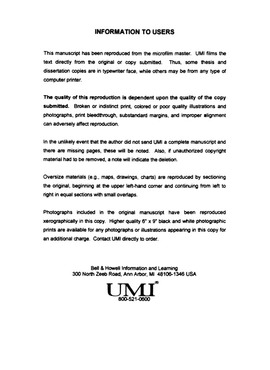| dc.contributor.advisor | Wood, Fred H., | en_US |
| dc.contributor.advisor | Maiden, Jeffrey, | en_US |
| dc.contributor.author | Baylis-hudson, Gayla Jeannette. | en_US |
| dc.date.accessioned | 2013-08-16T12:30:53Z | |
| dc.date.available | 2013-08-16T12:30:53Z | |
| dc.date.issued | 2000 | en_US |
| dc.identifier.uri | https://hdl.handle.net/11244/5950 | |
| dc.description.abstract | The data revealed that there were no significant differences between the subgroups in the ELO components. There were some differences, however, in the perceptions of the activities that were important in each of the components. Both the successful and unsuccessful respondents indicated that support provided through the ELO program, district personnel, and family and friends were very important in assisting them in their efforts to pursue National Board Certification. | en_US |
| dc.description.abstract | Quantitative and qualitative data were collected and analyzed to answer the research questions. The Education Leadership Oklahoma Participant Survey had a return rate of 85%. Frequencies and percentages were used to analyze the demographic data. Means, standard deviations, frequencies and percentages were used to determine the importance of the ELO activities during the Orientation, Training, Other Training, and Mentoring components. Independent sampled t-tests were used to determine if there were significant differences in the perceptions of the importance of the ELO activities to complete the NBC application between the successful and unsuccessful 1997--1998 ELO candidates. The level of significance was set at .05. | en_US |
| dc.description.abstract | The research participants for this study were the Education Leadership Oklahoma candidates that completed the National Board Certification process during 1997--1998. The Education Leadership Oklahoma Participant Survey (ELOPS) was developed specifically for this study to collect information from Education Leadership Oklahoma participants. | en_US |
| dc.description.abstract | The primary purpose of this study was to identify the specific practices, activities, and procedures included in the components of the Education Leadership Oklahoma (ELO) program and support from local education agencies, community, and family that differentiate between the successful and nonsuccessful Oklahoma teachers pursuing National Board Certification. The important activities of the support and training provided by ELO were identified. The important activities identified by each group were then compared to determine if there were differences between to the groups' data. | en_US |
| dc.description.abstract | The qualitative component included open-ended questions that were analyzed for common themes that indicated important support strategies. Follow-up interviews were examined for common themes of why certain activities were important for successfully achieving National Board Certification. Multiple qualitative methodologies were employed to provide background information concerning the ELO program including: personal interviews, document analysis, and observations of the sequence of events during the 1998--1999 ELO program activities that were organized similarly to the 1997--1998 ELO activities (Patton, 1990). | en_US |
| dc.format.extent | x, 221 leaves ; | en_US |
| dc.subject | National Board for Professional Teaching Standards (U.S.) | en_US |
| dc.subject | Education, Administration. | en_US |
| dc.subject | Teachers Certification Oklahoma. | en_US |
| dc.subject | Education Leadership Oklahoma (Program) | en_US |
| dc.title | Education Leadership Oklahoma: State support for National Board for Professional Teaching Standards Certification. | en_US |
| dc.type | Thesis | en_US |
| dc.thesis.degree | Ed.D. | en_US |
| dc.thesis.degreeDiscipline | Department of Instructional Leadership and Academic Curriculum | en_US |
| dc.note | Chairs: Jeffrey Maiden; Fred H. Wood. | en_US |
| dc.note | Source: Dissertation Abstracts International, Volume: 61-02, Section: A, page: 0432. | en_US |
| ou.identifier | (UMI)AAI9962979 | en_US |
| ou.group | Jeannine Rainbolt College of Education::Department of Instructional Leadership and Academic Curriculum | |
